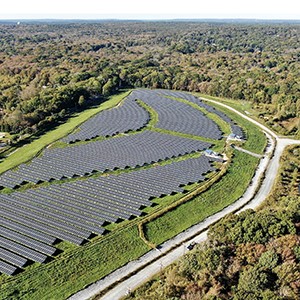 |
|
6/26/2023
|
Sen. DiMario/Rep. Speakman solar siting bill enacted
|
 STATE HOUSE – A comprehensive plan for the future of solar development in Rhode Island has been enacted. The law, sponsored by Sen. Alana DiMario and Rep. June Speakman, will reform the state’s net metering and renewable energy growth programs to expand solar development while protecting forests, creating well-paying jobs and stabilizing costs for ratepayers. STATE HOUSE – A comprehensive plan for the future of solar development in Rhode Island has been enacted. The law, sponsored by Sen. Alana DiMario and Rep. June Speakman, will reform the state’s net metering and renewable energy growth programs to expand solar development while protecting forests, creating well-paying jobs and stabilizing costs for ratepayers.
“The future of clean energy development in Rhode Island must include high labor standards for our workers, be affordable to ratepayers, promote responsible land use and protect our core forests. This bill makes smart changes to our solar program models to help achieve these goals,” said Senator DiMario, who serves as Chairwoman of the Senate Committee on Environment and Agriculture.
“Our little state has been leading the way,” said Representative Speakman (D-Dist. 68, Warren, Bristol). “From the first in the nation offshore wind farm to the Act on Climate to the boldest renewable energy standard in the country, we have a strong foundation. With this bill, we set the stage for the future of solar development as we transition to a cleaner world with good jobs, clean air and stable energy prices for all.”
Rhode Island currently offers two programs for solar developers, net metering and Renewable Energy Growth (REG). Under net metering, the owner of the panels is paid the retail rate (what consumers pay) for each kilowatt hour (kWh) of electricity produced. Most net metering participants have panels installed on their own property, but developers can build larger panel arrays offsite through virtual net metering. Under virtual net metering, developers partner with consumers (so-called off-takers) who then receive a portion of the credits for the electricity produced to offset their electricity bills. Currently, off-takers must be nonprofit or government partners, with very limited slots for residential customers. Commercial and industrial partners are currently not eligible to serve as off-takers.
Under REG, developers do not need to partner with off-takers, but are paid less per kWh for electricity generated over the life of the project. There is a statewide cap for REG developments of 40 megawatt (MW) per year. Each MW can power approximately 190 homes, and Rhode Island currently produces about 600 MW of solar energy per year.
Together, the programs have dramatically increased the amount of solar electricity produced in Rhode Island. That has led to thousands of jobs, a more resilient energy grid and lower carbon emissions.
But they have also led to deforestation, as clearing wooded areas for solar farms is often cheaper than preparing industrial and commercial areas. In recent years, clearing forested areas for solar development has been the leading cause of forest loss in Rhode Island. And some contend that the current structure of the virtual net metering program shifts the cost of maintaining transmission lines onto consumers that do not participate in the program.
“Rhode Island's original solar energy incentive programs were effective in getting solar development up and running. We saw what worked and what didn't. This bill reflects those lessons and moves us into the future of solar development in Rhode Island,” said Senator DiMario.
The law (2023-S 0684A, 2023-H 5853A) expands both the virtual net metering and REG programs, but adds restrictions to protect forests and ratepayers and phases out virtual net metering by 2030.
For virtual net metering, the law will allow commercial and industrial customers to serve as off-takers. But to protect ratepayers, such projects would be paid at 80% of the retail rate rather than the current 100%. The bill also caps the total amount of new virtual net metering projects to a total of 275 MW between April 15, 2023 and July 1, 2030. After that date, no new virtual net metering projects would be approved.
For the REG program, the law increases the annual statewide cap on new production from 40 MW to 300 MW per year.
For both programs, participating developers will not be allowed to develop solar in core forests, defined as unfragmented forests of 250 or more acres set back at least 25 yards from a mapped road. Exceptions could be made for projects that are already underway or projects on “preferred sites” within core forests. Preferred sites could include old landfills, gravel pits or brownfield sites which may be within core forests. The law also requires participating developers to comply with fair labor standards.
“This bill is a thoughtful, collaborative solution to many problems at once,” said Patrick Crowley, secretary treasurer of the Rhode Island AFL-CIO and co-chair of Climate Jobs RI. “By siting solar where it makes sense, we protect our forests and reduce our emissions. We also create thousands of good paying jobs, a more resilient energy grid and more stable electricity prices for all of us. I commend Senator DiMario, Representative Speakman and the leadership at the General Assembly for getting this done.”
For more information, contact:
Fil Eden, Publicist
State House Room 20
Providence, RI 02903
401.222.1886
|
|